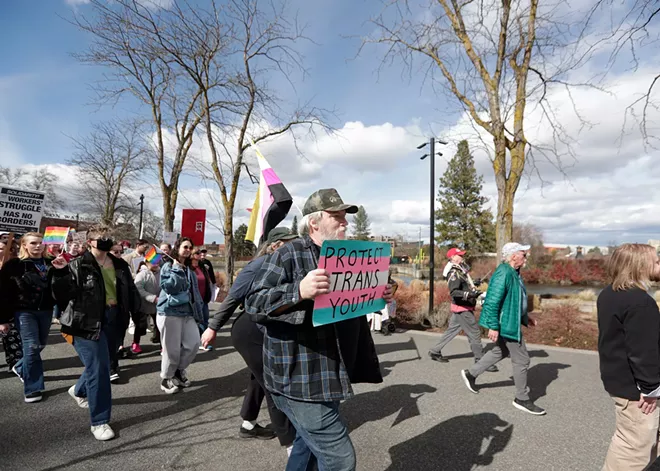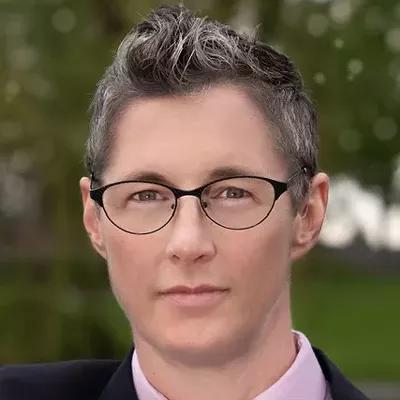
If you were in downtown Spokane on Saturday, you likely noticed the crowd gathered at Riverfront Park's red Radio Flyer wagon for Trans Spokane's Gender Freedom March. At first there were dozens of people, but that quickly grew to a few hundred.
As passing cars periodically honked in support, many attendees held Pride flags and signs that said things like "Facism will not change my gender," "Keep your mind out of my pants" and "YOU CAN'T ERASE US."
For about an hour, folks took turns at the microphone to speak out against executive orders by President Donald Trump that many say are an attempt to harm or erase transgender people.
"I am so proud to be part of a community who will not shut up."
"We are the opposite of liars, we tell the truth when it has cost us so very much."
"We cannot be erased at the stroke of a sharpie."
After sharing hope in the face of an onslaught of executive orders, the protesters, now nearly 1,000-strong, marched through the streets of downtown Spokane.
"It's a multi-systemic attack," says Louis Stay, executive director of Trans Spokane. "It's very important to hold these marches, and it's very important to show up at these marches because this is our chance to take action, to actually exercise what is in our rights as a good citizen, and to be there as a community instead of that single person that can be targeted."
On Jan. 20, his first day back in office, Trump signed an executive order stating that there are only two sexes, male and female, and that the term sex "refers to an individual's immutable biological classification." This prevents trans people from getting federal documents with their correct gender identity.
"The Secretaries of State and Homeland Security, and the Director of the Office of Personnel Management, shall implement changes to require that government-issued identification documents, including passports, visas, and Global Entry cards, accurately reflect the holder's sex," the order states.
A week later, Trump signed two more executive orders. One barred gender-affirming medical care for anyone under 19, threatening to withhold federal funds from any medical institution providing this care to minors. The other threatens to pull funding from K-12 schools that support trans students going by their preferred names and pronouns.
Trump has also signed executive orders to ban transgender people from serving in the military and to prevent trans girls and women from competing in sports with cisgender girls and women.
However, in most cases executive orders do not override federal laws, according to the American Civil Liberties Union. Many of these directives are being fought in the court system — which is also under attack from the Trump administration.
'FORESHADOWING'
The anti-trans federal orders may seem extreme in a Democrat-led state like Washington, but to those in Republican-led states like Idaho, laws targeting the trans community have been commonplace for years.
"It's been said that what happens in North Idaho is kind of a foreshadowing of what's going to happen across the rest of the nation," says Sarah Lynch, executive director of the North Idaho Pride Alliance. "What we're seeing nationwide are things that have been happening in North Idaho for several years now."
In 2023, Idaho legislators passed a law barring all gender-affirming medical care for minors. In 2024, they passed another law allowing government officials and employees, including public school staff, to refuse to address transgender individuals by their preferred name and pronouns.
This year, the Idaho Legislature has continued its anti-LGBTQ+ push in some serious ways, Lynch says.
The first was a memorial (a legal document) on marriage essentially asking the U.S. Supreme Court to overturn its decision in Obergefell v. Hodges, the 2015 case that federally legalized same-sex marriage. While it's not a bill that could become law in the state, the memorial passed the Idaho House 46-24; the Senate has yet to vote on it.
Lynch says bills forcing Idaho universities to adopt anti-trans bathroom and sports policies are also coming through.
"This is freedom of expression that they're attacking and attempting to silence and render LGBT people invisible in our state," Lynch says. "In a sense, it justifies our existence. It's validating to know that there's still work to do. On the other hand, it is overwhelming because we do have limited resources."
That's why in December, the North Idaho Pride Alliance rewrote its strategy. Lynch says the organization is now focused on visibility in the community and resilience, with the goal of opening a physical location within three years.
"Visibility is paramount, it's much easier to hate somebody if you can't see them and if you've never met them," Lynch says. "Being visible and out in our community is critical, and then that visibility leads to connection."
But do LGBTQ+ people in Idaho feel safe being visible? Lynch, who personally feels safe in North Idaho, says it varies: She's seen folks moving away to find appropriate health care and a sense of community.
She says the alliance is also focusing its efforts on anti-drag legislation, such as House Bill 230.
"The anti-drag bill essentially equates drag with a sexual exhibition, and that's just not the case," Lynch explains. "Drag is simply a performance art that's on the same spectrum as any other type of performance art. It isn't just inherently sexual."
While the anti-drag bill is disheartening, Lynch points to a recent ruling in Kootenai County District Court as hopeful.
In 2022, blogger Summer Bushnell accused drag queen Eric Posey of exposing himself during a performance at Pride in the Park in Coeur d'Alene. The video Bushnell published added a blurred circle around Posey's crotch, falsely implying his genitalia was showing to the audience. Posey sued Bushnell for defamation.
In May 2024, a jury found that Posey had been defamed and ordered Bushnell to pay more than $1.1 million.
"This is a unanimous jury of Idahoans who stood up and said this is not OK to lie about people," Lynch says.

FIRST US, THEN WHO?
Kassandra Forsman, a transgender woman, says the attacks on trans people will inevitably lead to attacks on other LGBTQ+ rights (like gay marriage).
Forsman, the acting vice president of Spokane Pride and a 20-year Marine Corps veteran, gets her medical care from Veterans Affairs. She says her ability to get hormone replacement therapy is in jeopardy, and her vocal therapy appointments were canceled without the chance to reschedule.
She's also been impacted by Trump's executive order recognizing only two sexes.
"I ordered my passport not long ago, and I had had my name and gender changed on my birth certificate to where you can't tell it's even an amended birth certificate," Forsman says. "I just got a letter from the State Department saying that they need further evidence of my gender assigned at birth."
Maeve Griffith, host of the weekly KYRS show Out and About and an Air Force veteran, has also noticed the lack of LGBTQ+ support within Veterans Affairs recently.
"When I go to the VA hospital, I notice that usually they have a lot of LGBT welcoming stuff in there," Griffith says. "That's gone now."
Additionally, there's a lack of clarity coming from the administration. Grant Ogren, executive director of SAN (formerly Spokane AIDS Network) believes that's the point.
"We don't know what's real. We don't know what's fake," Ogren says. "We don't know what's just been blown out of proportion, and I feel like that's what this administration wants."
The threat of losing government money isn't novel for SAN, which lost its funding in 2016 and had to minimize operations for years. But Ogren says the organization's state funding, which comes from the Ryan White HIV/AIDS Program and was restored in January 2024, is secure.
"We have been reassured by the Department of Health that our funding is pretty secure," Ogren explains. "I'm not gonna say 100% because nothing's ever 100%, but we have been told that we should not be affected."
However, Ogren says he's worried about the foreign HIV treatment cuts in the U.S. Agency for International Development, or USAID, and potential cuts to nationwide HIV prevention efforts under the U.S. Centers for Disease Control and Prevention.
Due to the Trump administration's pause on foreign aid, Ogren says more people are going to contract HIV, and those already living with HIV will face the risk of developing into an AIDS diagnosis. In the coming months, eight countries could exhaust their supply of HIV treatments, according to the World Health Organization. These include antiretroviral medications to manage symptoms of HIV, similar to how a diabetic might rely on insulin.
While it hasn't happened yet, the Wall Street Journal reported last week that the Department of Health and Human Services may cut funding from the CDC's domestic HIV prevention efforts.
"People living with HIV have nothing to do with the queer community, but this administration seems to think it does," Ogren says. "They're not looking at women who are getting it very fast from men that are either outside of their relationship or just not honest with their spouse. The hetero population living with HIV is increasing, and they're ignoring that."
HOPE IN COMMUNITY
Federal attempts to erode the rights of trans folks are harmful in many ways, but Griffith says it has also brought out more allies who may not have acted before.
"One thing that I really take heart in as a trans person is that we have a lot of allies right now. We were kind of the poster children for Trump's election — he spent millions of dollars making trans people the villain — but now we've got veterans, we've got federal workers, we've got the postal service workers, we have people on Social Security and Medicaid and Medicare," Griffith says. "We're right there at the forefront, and I think that we have a lot of allies now that we probably never had before Trump."
Plus, she says protections for trans people have been affirmed by the U.S. Supreme Court. In 2020, the court ruled that discrimination against transgender people is a form of sex-based discrimination and as such is prohibited under the Civil Rights Act of 1964. Griffith says that decision should stand in the way of the anti-trans executive orders.
"It's not beyond the pale that they would totally reverse the decision," Griffith says, pointing to the Roe v. Wade reversal, "but I find some solace in that decision."
Additionally, Griffith and Stay both feel that Spokane has been mostly accepting of trans folks over the years.
"I would say Spokane is very, very safe, coming from a red state. However, I do think we have a ways to go," says Trans Spokane's Stay, who grew up in Utah. "Washington's protections help a lot with safety here, too."
For example, Washington requires its public schools to be inclusive of trans and gender-nonconforming students, discrimination based on gender expression or identity is prohibited, and in 2023 a shield law went into effect protecting those seeking gender-affirming medical care here from civil and criminal actions in their home state.
Still, Spokane Pride's Forsman, who says she's always felt safe in Spokane, thinks it's hard to remain hopeful when there isn't a tangible light at the end of the tunnel.
"The only light that I see right now appears to be an oncoming train," Forsman says. ♦



























